Catégories
Documents disponibles dans cette catégorie (3395)
 Ajouter le résultat dans votre panier Affiner la recherche
Ajouter le résultat dans votre panier Affiner la recherche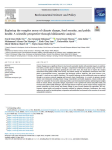
Article
N.I. Mohd Ali ; N.S. Mohamad ; N.I. Hassan ; Z. Kallas ; M.A. Che Mustapa ; K.C. Lam ; K. Aiyub ; S.S. Sharif Ali ; N.I. Mohd Ali |Climate change poses a significant threat to food security and public health, with potential impacts on nutrition, food safety, and the spread of diseases. Through a comprehensive bibliometric analysis using VOSviewer software and Scopus databas[...]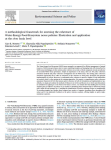
Article
The Water-Energy-Food-Ecosystem (WEFE) nexus emerged as an approach for efficient management of natural resources. WEFE nexus governance aims to ensure exploiting synergies and managing trade-offs arising from the WEFE nexus interlinkages. In th[...]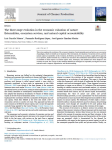
Article
This review analyzes the evolution of the economic valuation of environmental assets and services as a succession of paradigms, which we identify as (i) valuation of the environment, (ii) valuation of ecosystem services, and (iii) natural capita[...]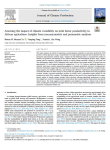
Article
B.M. Bernard ; Y. Song ; Sumiati, ; X. Wang |This study examines the effects of temperature and precipitation variability on total factor productivity (TFP) growth in African agriculture using a comprehensive two-stage analytical approach that incorporates both non-parametric and parametri[...]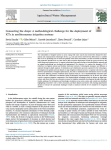
Article
K. Daudin ; G. Belaud ; C. Leauthaud ; Z. Bouzidi ; C. Lejars |The vulnerability of irrigated systems in areas coping with water scarcity has boosted the demand for information and communication technologies (ICTs), e.g. tools and services derived from field sensors or satellite data. ICTs are promising too[...]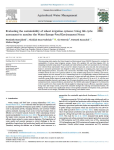
Article
This pioneering study employs the Water-Energy-Food-Environment Nexus (WEFEN) framework to evaluate the sustainability of various wheat irrigation systems—furrow (FI), sprinkler (SI), and drip irrigation (DI)—by integrating renewable energy (sol[...]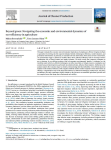
Article
This paper evaluates the economic and environmental implications of adopting eco-efficient irrigation methods in agriculture by delving into the nuanced interplay between technological efficiency, market dynamics, and government interventions. I[...]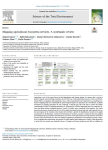
Article
Agriculture is one of the major drivers of land degradation and climate change. It is known that it can have positive impacts on provisioning ecosystem services (ES) (e.g., food production); however, it has as well detrimental effects on regulat[...]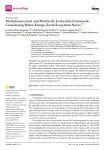
Article
L.S. Kyrgiakos ; D.D. Tosiliani ; A. Angelopoulos ; V. Bonomelli ; G. Kleftodimos ; M. Vasileiou ; C. Kleisiari ; A. Oikonomou ; P. Prosperi ; H. Belhouchette ; G. Vlontzos |The agricultural sector in the Mediterranean Basin is the largest consumer of water, using 70% of freshwater resources for crop irrigation, which accounts for 85% of the region’s agricultural output. With climate change and population growth exp[...]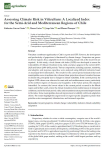
Article
Viticulture contributes significantly to Chile?s exports and GDP. However, the development and productivity of grapevines is threatened by climate change. Grapevines are grown in diverse regions; thus, adaptable tools for evaluating climate risk[...]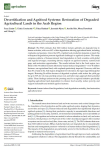
Article
F. Ziadat ; G. Conchedda ; F. Haddad ; J. Njeru ; A. Brès ; M. Dawelbait ; L. Li |The FAO estimates that 1660 million hectares globally are degraded due to human activities, with over 60% of this degradation affecting agricultural lands, including croplands and pastures. Given that 95% of global food production depends on lan[...]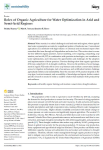
Article
Water scarcity is a critical challenge in arid and semi-arid regions, where agricultural water consumption accounts for a significant portion of freshwater use. Conventional agriculture (CA) methods with high reliance on chemical and mechanical [...]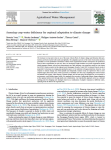
Article
S. Yvoz ; M. Lechenet ; P. Amiotte-Suchet ; T. Castel ; E. Betting ; M. Ubertosi |The increase in crop water stress is one of the most critical effects of climate change and threatens farm production and food security both locally and globally. The adaptation process of the entire food system must be grounded in a local quant[...]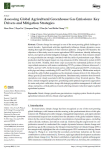
Article
Climate change has emerged as one of the most pressing global challenges in recent decades. Agricultural activities significantly influence climate dynamics, necessitating thorough investigation of their emission patterns. Using the FAO datasets[...]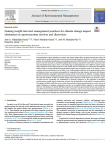
Article
Given agriculture's direct dependence on nature, the climate change effects on agroecosystems may reduce (in quantity and/or quality) agroecosystem services and increase agroecosystem disservices. To achieve a transition pathway for sustainable [...]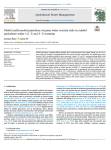
Article
Rainfed agriculture, sustaining billions globally, faces escalating threats from climate change, yet the role of green water (soil moisture) in quantifying these risks remains critically understudied. We quantify green water scarcity (GWS)—insuf[...]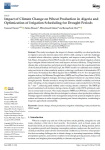
Article
This study investigates the impact of climate variability on wheat production in Algeria’s semi-arid interior plains from 2014 to 2024, aiming to curb the challenges of rainfed wheat cultivation, optimize irrigation, and improve water productivi[...]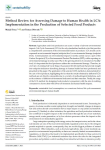
Article
Agriculture and food production can cause a variety of adverse environmental impacts. Life Cycle Assessment (LCA) is the only standardised method so far that provides a comprehensive assessment of the environmental burden of products. LCA result[...]
Article
While agriculture’s role in carbon emissions has been studied broadly, there is a notable lack of disaggregated studies that focus on the carbon footprint of specific crops, such as tomatoes. This is further exacerbated by the fact that tomatoes[...]
Article
Unpredictable climate variations, including severe droughts and heat waves, pose significant challenges to agricultural water management and threaten the economic sustainability of farmers. This study examines the effects of different irrigation[...]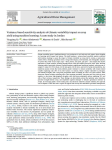
Article
Y. Xu ; A. Albalawneh ; M. Al-Zoubi ; H. Baroud |Climate variability poses a significant threat to crop production in arid and semi-arid regions, where droughts are becoming more frequent and intense. This study employs a variance-based sensitivity analysis combined with machine learning to as[...]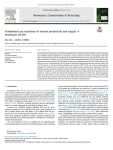
Article
Numerous life cycle assessments (LCA) have been performed on tomato production; however, results vary greatly due to different system boundaries and assumptions, tomato production methods, and geography. This study seeks to identify the major dr[...]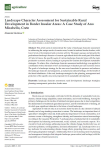
Article
This article seeks to demonstrate the value of landscape character assessment in addressing the unique needs of remote areas, located at national insular borders, with lower levels of development and economic activity. The paper assesses and pre[...]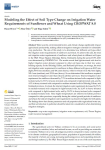
Article
Water scarcity, environmental factors, and climate change significantly impact agricultural productivity, making efficient irrigation strategies essential for sustainable crop production. The aim of this study is to determine how different soil [...]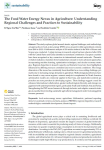
Article
This study explores global research trends, regional challenges, and methodological approaches in food-water-energy (FWE) nexus research within agricultural contexts from 2000 to 2024. A bibliometric analysis of 929 articles indexed in the Web o[...]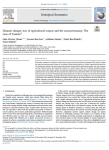
Article
S.D. Yilmaz ; S. Ben-Nasr ; A. Mantes ; N. Ben-Khalifa ; I. Daghari |This paper constructs an empirical, multi-sectoral, open-economy Stock-Flow Consistent (SFC) model to assess the long-term macroeconomic impact of a sustained climate-induced decline in Tunisia's agricultural production. Our framework captures t[...]
Article
C. Ceseracciu ; C. Ceseracciu ; T.P.L. Nguyen ; R. Deriu ; G. Branca ; A.-E.K. Vozinaki ; G.P. Karatzas ; T. Mellah ; H. Akrout ; U. Yildirim ; Mehmet A. Kurt ; S. Jomaa ; A. Carletti ; P.P. Roggero |This study focuses on groundwater governance in Mediterranean socio-ecological systems, where anthropogenic and climate-related pressures lead to issues such as overexploitation, salinisation, and pollution, particularly in coastal areas. It pro[...]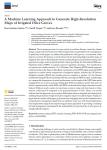
Article
The increasing severity of water scarcity in southern Europe, caused by climate change, requires advanced and more efficient approaches to agricultural water management. In particular, in this paper, we address this problem for olive groves-a co[...]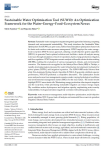
Article
Sustainable water management requires integrated approaches balancing competing demands and environmental sustainability. This study introduces the Sustainable Water Optimization Tool (SUWO), an open-source, Python-based simulation-optimization [...]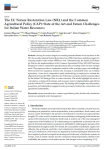
Article
A. Manzoni ; M. Hamam ; G. Pastorelli ; L. Servadei ; S. Chiappini ; A. Pesce ; S. Tarangioli ; R. Pergamo |Among its various targets on restoring natural habitats and ecosystems in the EU, the recently adopted Nature Restoration Law (NRL) introduces ambitious targets for restoring surface water bodies (SWBs) as well. Simultaneously, the Italian CAP S[...]










